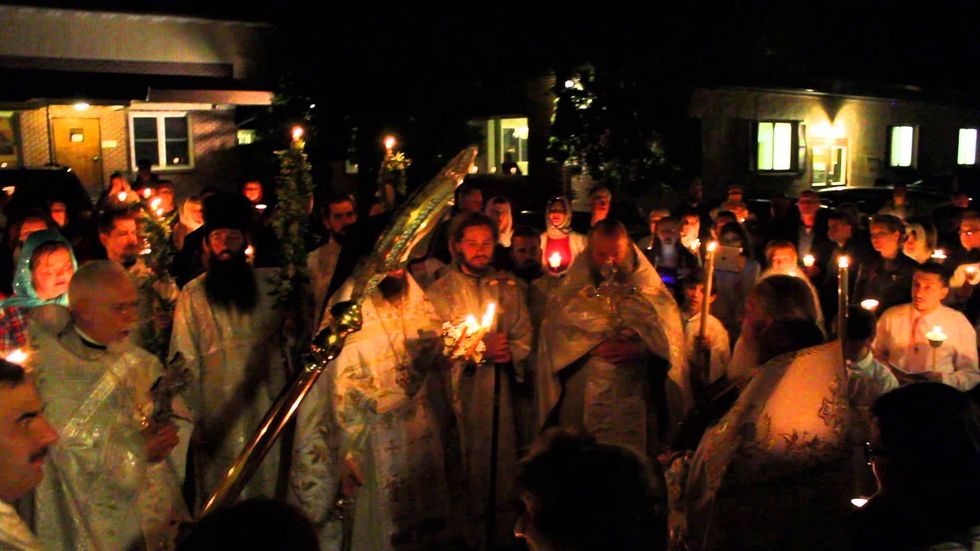As Easter comes and goes every year, Orthodox Christians sit back and wait until our turn to celebrate the joyous feast of Pascha comes along. Even though there are roughly 300 million Orthodox Christians in the U.S., we are the minority and most people aren't familiar with our traditions. So to begin, here is an insight into my everyday life.
When we talk about our Easter, we use the Greek word for the holiday, "Pascha." Since the date for Western Easter changes every year, the date for ours changes as well. Every couple, we celebrate it on the same day if they coincide, but usually they are on different dates. So why do we do this funky thing of celebrating both Christmas and Pascha ona different date, you ask?
The Orthodox Church goes by the Julian calendar, originating from Julius Caesar. However, the Julian calendar is slightly astronomically incorrect by assuming that a full year is 365.25 days when it's actually 11 minutes shorter. So in turn, Pope Gregory XIII introduced the Gregorian Calendar, which is the astronomically correct one that the world uses today. But why didn't we transfer over like everyone else did?
One of the fundamental beliefs of Orthodoxy stems from the word "Pravoslavie" in Russian, which essentially translates to the "right/traditional way to worship God." The church began with a set of beliefs and traditions and continues to uphold them without change. So for 2000+ years of Christianity, our services have remained almost unchanged. When the new calendar was introduced, the Orthodox church decided to remain on the Julian calendar and keep it as the church calendar. Because of this, there is a 13-day difference between the Gregorian and Julian calendars, which is why we celebrate Christmas on January 7th versus December 25th.
Pascha is the most important feast of the year; it symbolizes Christ's crucifixion and resurrection from the tomb. The most beautiful, long and spiritually enlightening services take place during Holy Week, the week leading up to Pascha. It begins with Palm Sunday, the celebration of the triumphant entrance of Christ into the royal city of Jerusalem, to Holy Friday. (commonly known as Good Friday). At last, on Saturday night, the service begins at 11:40 p.m. Pascha is celebrated by having liturgy going overnight into the early hours of the morning.
This is the one day of the year where we have a night service. When the clock strikes midnight, the church bells begin to ring as the priests lead the people out of the church to stand outside for what is known as "The Procession of the Cross." Everyone follows the priests to walk around the church three times and comes back to the entrance, where it is finally time to shout our greetings, usually in three different languages: Russian, Greek and English:
"Christ is Risen!"
"Indeed He is Risen!"
And if the priest is feeling cool, he'll even throw in some Arabic or Georgian to see how many people know the greeting in those languages. Once we return inside, the liturgy continues until around 3:30-4:00 a.m.
Once the servic e is over, everyone floods into the dining hall for what is known as a "trapeza". Our Pascha baskets aren't your traditional Easter baskets, either. Once we set them down on the tables, another Procession of the Cross inside follows to bless the food, and everyone begins celebrating with family and friends.
Our baskets are filled with three major components: Kulich, Pascha cheese and pysanky. Kulich is a sweetened, dome-shaped yeast bread, rich in butter and eggs and also containing raisins and topped with a sugar icing. Pascha cheese is a festive dish made of cottage cheese, butter, dried fruits and vanilla, which is made in a dome shape with a cross drawn on to represent a church. Pysanky is known as a Ukrainian Easter egg, decorated with traditional Ukrainian folk designs using a wax-resist method. The origin of the word "pysanka" comes from the verb pysaty, which means "to write" or "to inscribe", since the designs are not painted on, but are inscribed with beeswax.
While describing this glorious feast could take hours, here is a brief insight into the unique way all Eastern European countries celebrate Pascha, which falls on April 8th, 2018 this year.






 people sitting on chair in front of computer
people sitting on chair in front of computer



 all stars lol GIF by Lifetime
all stars lol GIF by Lifetime two women talking while looking at laptop computerPhoto by
two women talking while looking at laptop computerPhoto by  shallow focus photography of two boys doing wacky facesPhoto by
shallow focus photography of two boys doing wacky facesPhoto by  happy birthday balloons with happy birthday textPhoto by
happy birthday balloons with happy birthday textPhoto by  itty-bitty living space." | The Genie shows Aladdin how… | Flickr
itty-bitty living space." | The Genie shows Aladdin how… | Flickr shallow focus photography of dog and catPhoto by
shallow focus photography of dog and catPhoto by  yellow Volkswagen van on roadPhoto by
yellow Volkswagen van on roadPhoto by  orange i have a crush on you neon light signagePhoto by
orange i have a crush on you neon light signagePhoto by  5 Tattoos Artist That Will Make You Want A Tattoo
5 Tattoos Artist That Will Make You Want A Tattoo woman biting pencil while sitting on chair in front of computer during daytimePhoto by
woman biting pencil while sitting on chair in front of computer during daytimePhoto by  a scrabbled wooden block spelling the word prizePhoto by
a scrabbled wooden block spelling the word prizePhoto by 
 StableDiffusion
StableDiffusion
 StableDiffusion
StableDiffusion
 StableDiffusion
StableDiffusion

 women sitting on rock near body of waterPhoto by
women sitting on rock near body of waterPhoto by 
 Photo by
Photo by  Photo by
Photo by  Photo by
Photo by  Photo by
Photo by  Photo by
Photo by  Photo by
Photo by  Photo by
Photo by  Photo by
Photo by  Photo by
Photo by  Photo by
Photo by 








